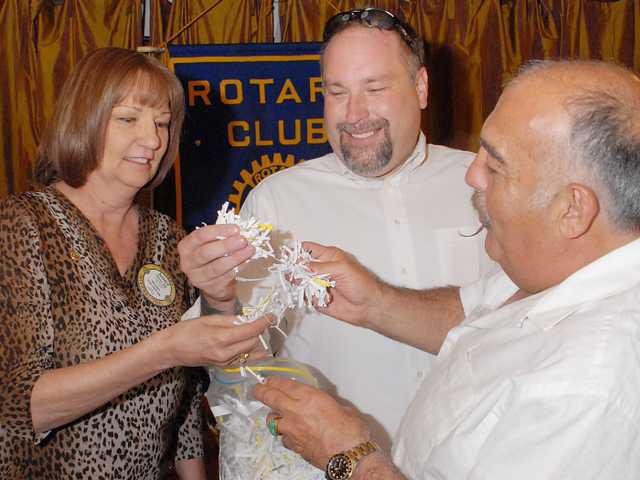Shredded document restoration and cyber crime are both a reality in our country today, Modesto private investigator Jon Jacobson of the Dakota Information Group, told Ripon Rotarians at a recent noon meeting at the Barnwood Restaurant.
Jacobson ran strips of shredded documents through his fingers, explaining that he can restore the tiny strips of paper into their original format within a matter of seconds. Shredding that has gotten mixed with the remnants of several individual documents is also possible to restore, but it will take longer – minutes rather than seconds, he said.
Cyber crime and identity theft specifically, drew the attention of Rotarians as Jacobson explained that with the additional threats of spoofing and denial of service attacks are added to the active list. Cyber attacks are adding up to some 39 billion spams a day, he noted.
Jacobson offered his audience remedies of what they can do to protect their businesses and personal information.
The most important – never leave a USB port open and unprotected on a computer. Also, the use of a credit card number in making purchases on line is just asking for trouble – not knowing when you are being monitored.
Spoofing includes intercepting caller IDs and a range of illicit internet activities with the most common being phishing, spyware, keylogging and hacking. Later technology has allowed the crime world to invent more advanced and innovative ways to harvest personal information as a roadmap to open bank accounts and take out new loans in victims’ names.
Protection is simple: never share personal information on line, he said. It will just be there for the taking.
The chief set of players in the cyber crime world are former Soviet military officers, the Russian Mafia – more active in Europe – and professional hackers, spammers, traditional Italian Mafia and basic or infant crime organizations, he explained.
He further noted that the former Soviet military officers are much more corrupt than they were in the military. “Back in the early 1990s – with the fall of the communist government – a lot of these guys were out of work. They had no way to produce an income but they still had skills. They were good at money laundering and they were good at moving goods across borders. They had preexisting connections with criminal organizations,” Jacobson said.
The internet black market pricing today includes “exploit flaws” that allows hackers access to a victim’s PC. Buyers include Russian Mafia and the French and Chinese governments offering from $100 to $5,000, he explained. The French and the Chinese sell those stolen cards back to the parent companies involved, Jacobson added.
A list of 1000 working credit card numbers has a street value from $500 to $5,000. The annual salary for a U.S. based, highly skilled hacker working for a spammer goes from $200,000 to $300,000.
Precision tactics breaking into computers in hotel rooms focuses first on the hotel room internet connection with the criminal checking into the same hotel to ply his trade. They often use closed circuit video cameras and other physical tools usually when the target victim is out of his room.
The most vulnerable are seminar speakers and corporate trainers, with law enforcement often monitoring internet networks at conferences, especially in Las Vegas and Atlantic City, Jacobson added.
In business offices, the hackers often pose as regular, visiting office personnel or traditional new vendors such as Verizon or AT&T technicians complete with uniforms and a working van outside that gives them more credibility with staffers. The impersonators quickly make friends with key personnel on social media sites as well as in the corporate lobbies and suites as they plant hardware-based sniffing or keylogging devices.
Jacobson said he can put a USB transmitter together in a matter of minutes, plug it in and go back out into the parking lot where he can monitor a computer almost immediately from his van without anyone being the wiser while harvesting confidential information and records.
“Conventional or cell-based listening devices – bugs – are much more common than you would think. For $20, with a 9-volt battery, EBay and a soldering iron, it’s all possible,” he said. “USB ports are nothing more than unlocked, open doors. Planting keylogging equipment is the number one tool used to gather sensitive data,” he quipped.
A longtime technique that has traditionally been used by disgruntled IT employees has been to leave a “back door” open in their former corporate office system when they leave a firm where “script kiddies” can gain skills fairly quickly, rising in the status of breaking into online chat rooms and online text messaging services.
Those novices often join together to form professional hacking groups that perform attacks initiated by the disgruntled former IT employees. Jacobson said this prevents their taking the blame for the cyber attacks – passing it on to the newbees they have tapped into service.
Jacobson can be reached at jon@dakotainfogroup.com in Modesto.
FIGHTING CYBER CRIME
PI offers tips to keep your info safe


